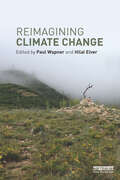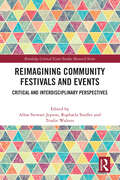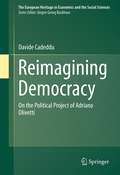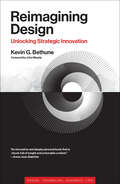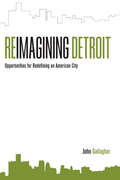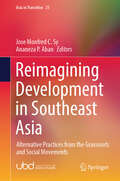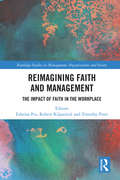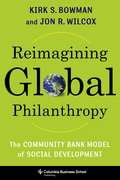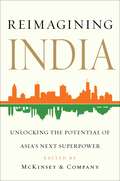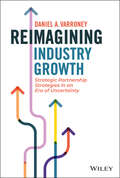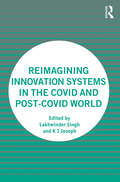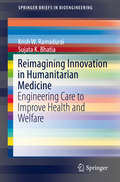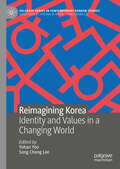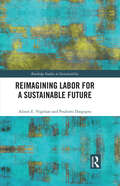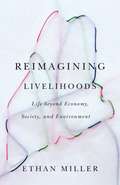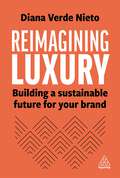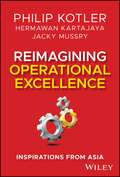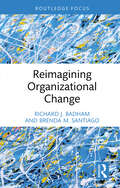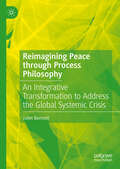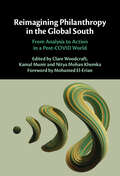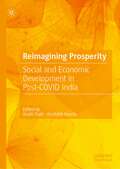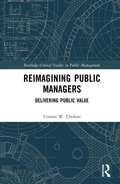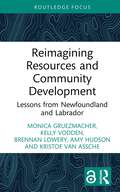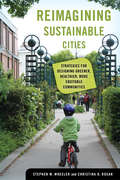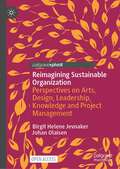- Table View
- List View
Reimagining Climate Change (Routledge Advances in Climate Change Research)
by Paul Wapner Hilal ElverResponding to climate change has become an industry. Governments, corporations, activist groups and others now devote billions of dollars to mitigation and adaptation, and their efforts represent one of the most significant policy measures ever dedicated to a global challenge. Despite its laudatory intent, the response industry, or ‘Climate Inc.’, is failing. Reimagining Climate Change questions established categories, routines, and practices that presently constitute accepted solutions to tackling climate change and offers alternative routes forward. It does so by unleashing the political imagination. The chapters grasp the larger arc of collective experience, interpret its meaning for the choices we face, and creatively visualize alternative trajectories that can help us cognitively and emotionally enter into alternative climate futures. They probe the meaning and effectiveness of climate protection ‘from below’—forms of community and practice that are emerging in various locales around the world and that hold promise for greater collective resonance. They also question climate protection "from above" in the form of industrial and modernist orientations and examine large-scale agribusinesses, as well as criticize the concept of resilience as it is presently being promoted as a response to climate change. This book will be of great interest to students and scholars of climate change, global environmental politics, and environmental studies in general, as well as climate change activists.
Reimagining Community Festivals and Events: Critical and Interdisciplinary Perspectives (ISSN)
by Trudie Walters Allan Stewart Jepson Raphaela StadlerThis book celebrates and builds on Alan Clarke (1956–2021) and Allan Jepson’s 2015 book Exploring Community Festivals and Events. It showcases how far the study of community festivals and events has come in the intervening years, and in so doing it is a response to recent calls for researchers to take a more critical approach to event studies.This is an interdisciplinary book that draws together empirical research across a wide range of community event types, sizes and within diverse communities. Chapters in this book are grouped into four themes that highlight the breadth and depth of work being done: reviving and maintaining tradition(s); a focus on belonging; challenges and tensions; and innovations in teaching and research. Another of its core strengths is its international perspective – the book encompasses research from around the world including Turkey, Portugal, Greece, India, the UK, the US, Austria and New Zealand. There is also a diverse range of theoretical lenses applied to the study of community events, and some innovative methodologies used to achieve research aims and objectives.This volume will appeal to students and researchers in the fields of critical event studies, cultural studies, place-making, tourism, music, sociology and geography. Several chapters also provide insights and key learnings for those lecturing and working in event management and industry professionals.
Reimagining Democracy
by Davide CadedduIn the journal articles, historiographical essays, and numerous references to the political thought of Adriano Olivetti, the term constantly used to characterize his thinking is 'utopia'. It is from this word, or rather, the misuse of this word, where one can begin to shed light on Olivettian political thinking. The term 'utopia', which has come to designate an entire vein of political literature, has also entered into common usage to define an impossible project, a wide-eyed dream; and a 'utopian' is that individual who longs for abstract projects instead of concrete ideas. It would be unproductive to resort to the diverse arguments of Firpo, of Mannheim, or of Bloch, of the philosophers of the Frankfurt School or others, since, as Giovanni Sartori has observed, after the word ceases to exist - where utopia is understood to mean impossibility - the impossibilities still remain. So, precisely because the literature on the political thought of Olivetti appears to suffer greatly from 'empirical' influences, it seems necessary to confront the complexities of his presumed utopianism with a methodological approach. This book investigates the inherent 'impossibilities', if they indeed exist, in the political thought of Olivetti. It also seeks to understand, as a result, if the Olivettian ideal is lacking in any true consistency, since it is secluded from an adequate analysis of historical reality, or if it is, rather, an idealism which does not lose sight of reality, in an attempt to overturn it as the basis for a plausible global vision. This book will be of interests to students and scholars in history, political economy and philosophy.
Reimagining Design: Unlocking Strategic Innovation (Simplicity: Design, Technology, Business, Life)
by Kevin G. BethuneThe power of transformative design, multidisciplinary leaps, and diversity: lessons from a Black professional&’s journey through corporate America.Design offers so much more than an aesthetically pleasing logo or banner, a beautification add-on after the heavy lifting. In Reimagining Design, Kevin Bethune shows how design provides a unique angle on problem-solving—how it can be leveraged strategically to cultivate innovation and anchor multidisciplinary teamwork. As he does so, he describes his journey as a Black professional through corporate America, revealing the power of transformative design, multidisciplinary leaps, and diversity. Bethune, who began as an engineer at Westinghouse, moved on to Nike (where he designed Air Jordans), and now works as a sought-after consultant on design and innovation, shows how design can transform both individual lives and organizations. In Bethune&’s account, diversity, equity, and inclusion emerge as a recurring theme. He shows how, as we leverage design for innovation, we also need to consider the broader ecological implications of our decisions and acknowledge the threads of systemic injustice in order to realize positive change. His book is for anyone who has felt like the &“other&”—and also for allies who want to encourage anti-racist, anti-sexist, and anti-ageist behaviors in the workplace. Design transformation takes leadership—leaders who do not act as gatekeepers but, with agility and nimbleness, build teams that mirror the marketplace. Design in harmony with other disciplines can be incredibly powerful; multidisciplinary team collaboration is the foundation of future innovation. With insight and compassion, Bethune provides a framework for bringing this about.
Reimagining Detroit: Opportunities for Redefining an American City
by John GallagherSuggests ways for Detroit to become a smaller but better city in the twenty first century and proposes productive uses for the city's vacant spaces.
Reimagining Development in Southeast Asia: Alternative Practices from the Grassroots and Social Movements (Asia in Transition #21)
by Jose Monfred C. Sy Ananeza P. AbanThis volume consolidates chapters from across Southeast Asia as a means of discussing alternative development pathways. It presents radical re-imaginings of how development might look, considered alongside the growing disillusionment over mainstream development models. In suggesting alternative models of development, it reframes participatory processes from the developing world, discussing practices of decolonization, anti-capitalism, plurality, anti-racism, effacing patriarchy, and ecological sustainability, designed and executed by grassroot communities and civil society organisations (CSOs). The grassroots and social movement paradigms highlighted in this collection seek to challenge and change the dominant model of development instituted in ASEAN, which have largely failed in meaningfully addressing the issues faced by different sectors. That the book project springs from an engagement between scholars and on-the-ground practitioners means that several chapters combine reflective, case-based viewpoints. To this end, the book is relevant to scholars, students, and practitioners working in areas related to Southeast Asian politics, economy, and culture.
Reimagining Faith and Management: The Impact of Faith in the Workplace (Routledge Studies in Management, Organizations and Society)
by Edwina Pio; Robert Kilpatrick; Timothy PrattMuch contemporary research ignores or is dismissive of the growth of global religiosity, even though 90% of the global population sees the world through a commitment to some kind of faith. Reimagining Faith and Management addresses this issue and extends the research on the impact of faith in the various aspects of management, such as negotiation, leadership, entrepreneurship, governance, innovation, ethics, finance and careers. Faith impacts how individuals and organisations envision, manage and respond to their various stakeholders, communities, the natural environment and the world around them. This book presents various facets of how faith, values and/or ideological outlook which informs, influences and adds mystery that inspires and impels individuals and organisations. The twenty-one chapters are based on academic research and offer practical managerial recommendations. The book is divided into three sections: Faithful futures impacting individuals; Faithful futures impacting organisations; and Faithful futures impacting society. Each chapter presents a theoretical base and includes practical implications. The book is therefore ideal reading for educators, researchers and students of business, management, career studies, faith-based organisations, corporate governance, and business ethics, as well as religious studies, including applied theology.
Reimagining Global Philanthropy: The Community Bank Model of Social Development
by Kirk Bowman Jon WilcoxWell-meaning Westerners want to find ways to help the less fortunate. Today, many are not just volunteering abroad and donating to international nonprofits but also advancing innovations and launching projects that aim to be socially transformative. However, often these activities are not efficient ways of helping others, and too many projects cause more harm than good.Reimagining Global Philanthropy shares the journey of a conservative banker and a progressive professor to find a better way forward. Kirk S. Bowman and Jon R. Wilcox explain the boom in the global compassion industry, revealing the incentives that produce inefficient practices and poor outcomes. Instead of supporting start-up projects with long-shot hopes for success, they argue, we can dramatically improve results by empowering local leaders.Applying lessons from the success of community banks, Bowman and Wilcox develop and implement a new model that significantly raises philanthropic efficacy. Their straightforward and rigorously tested approach calls for community members to take the lead while outside partners play a supporting role. Bowman and Wilcox recount how they tested the model in Brazil, demonstrating the value of giving people in marginalized communities the opportunity to innovate. In a time of widespread social reckoning, this book shows how global philanthropy can confront its blind spots and failures in order to achieve truly transformative outcomes.Readers can access five of the documentary films discussed in the book on a companion website. In addition to the films, chapter discussion questions and other supplemental materials are also available at the site.
Reimagining India: Unlocking the Potential of Asia's Next Superpower
by Inc. McKinsey & CompanyReimagining India brings together leading thinkers from around the world to explore the challenges and opportunities faced by one of the most important and least understood nations on earth. India’s abundance of life—vibrant, chaotic, and tumultuous—has long been its foremost asset. The nation’s rising economy and burgeoning middle class have earned India a place alongside China as one of the world’s two indispensable emerging markets. At the same time, India’s tech-savvy entrepreneurs and rapidly globalizing firms are upending key sectors of the world economy. But what is India’s true potential? And what can be done to unlock it? McKinsey & Company has pulled in wisdom from many corners—social and cultural as well as economic and political—to launch a feisty debate about the future of Asia’s “other superpower.” Reimagining India features an all-star cast of contributors, including CNN’s Fareed Zakaria; Mukesh Ambani, CEO of India’s largest private conglomerate; Microsoft founder Bill Gates; Google chairman Eric Schmidt; Harvard Business School dean Nitin Nohria; award-winning authors Suketu Mehta (Maximum City), Edward Luce (In Spite of the Gods), and Patrick French (India: A Portrait); Nandan Nilekani, Infosys cofounder and chairman of the Unique Identification Authority of India; and a host of other leading executives, entrepreneurs, economists, foreign policy experts, journalists, historians, and cultural luminaries. These essays explore topics like the strengths and weaknesses of India’s political system, growth prospects for India’s economy, the competitiveness of Indian firms, India’s rising international profile, and the rapid evolution of India’s culture. Over the next decade India has the opportunity to show the rest of the developing world how open, democratic societies can achieve high growth and shared prosperity. Contributors offer creative strategies for seizing that opportunity. But they also offer a frank assessment of the risks that India’s social and political fractures will instead thwart progress, condemning hundreds of millions of people to enduring poverty. Reimagining India is a critical resource for readers seeking to understand how this vast and vital nation is changing—and how it promises to change the world around us.
Reimagining Industry Growth: Strategic Partnership Strategies in an Era of Uncertainty
by Daniel A. VarroneyTap into the potential of strategic partnerships with industry associations in this groundbreaking new book Reimagining Industry Growth offers readers a blueprint to harnessing the power of leading industry associations as strategic partners. By utilizing those partnerships, business leaders will become able to leverage the collective strength of the supply chain to overcome challenges, address uncertainty, mitigate risks, and position their industries for growth. The book provides an overview of strategic partnerships, how they work, and how they can be applied to industry relationships with trade associations. It includes: Illuminating and factual case studies outlining strategic partnerships in five different industry segments Roadmaps for executives to apply the lessons learned from industry success stories on leveraging relationships with trade associations Advice on how to move the needle for entire industries via effective strategic partnerships and achieve unprecedented growth Ideal for executives, managers, business leaders of all kinds, business students and professors, and association executives. Reimagining Industry Growth is required reading for anyone who hopes to tap into the potential strength and value of effective strategic partnerships.
Reimagining Innovation Systems in the COVID and Post-COVID World
by Lakhwinder Singh and K J JosephCountries around the world are working to counter the devastating effects of the COVID-19 pandemic on their healthcare systems, economies, and industries. This book brings together strategies for the adoption of new technologies and innovation systems which would help re-invigorate social and economic institutions and help communities, especially in the Global South. The book focuses on innovation systems that address health and socioeconomic inequalities in countries such as India, Africa, Brazil, Costa Rica, and others. It looks into the responses of different countries to the shocks inflicted on the economy and health systems by the pandemic from the perspective of government institutions as well as businesses, industries, and communities. The pandemic forced many organizations to embrace various innovative strategies to contain the spread of COVID-19 and ameliorate the lives of people including employees, people from marginalized communities, and low-income groups who have suffered due to the disease. The chapters in this book study innovative interventions and community-based measures which reached many people and paved the way for policies which helped rebuild communities sustainably. The volume also analyses how these newly created and streamlined health and economic innovation systems will be carried forward in the post-COVID-19 world to address weaknesses in health and governance and address inequalities, especially for countries in the Global South. This book will be of interest to scholars and students of economics, political economy, health and economics, development studies, public policy, and sociology.
Reimagining Innovation in Humanitarian Medicine: Engineering Care to Improve Health and Welfare (SpringerBriefs in Bioengineering)
by Sujata K. Bhatia Krish W. RamaduraiThroughout history, humanity has been plagued by a myriad of humanitarian crises that seemingly take the form of perpetual human suffering. Today, approximately 125,000,000 people require humanitarian assistance as the result of famine, war, geopolitical conflict, and natural disasters. A core component of this suffering is afflictions related to human health, where disturbances strain or overwhelm the existing healthcare infrastructure to create the conditions for an increase in morbidities and co-morbidities. One of the more startling elements is the loss of life to preventable medical conditions that were not properly treated or even diagnosed in the field, and is often due to the limited interventional capacity that medical teams and humanitarian practitioners have in these scenarios. These individuals are often hindered by medical equipment deficiencies or devices not meant to function in austere conditions. The development of highly versatile, feasible, and cost-effective medical devices and technologies that can be deployed in the field is essential to enhancing medical care in unconventional settings. In this book we examine the nature of the creative problem-solving paradigm, and dissect the intersection of frugal, disruptive, open, and reverse innovation processes in advancing humanitarian medicine. Specifically, we examine the feasible deployment of these devices and technologies in unconventional environments not only by humanitarian aid and disaster relief agencies, but also by crisis-affected communities themselves. The challenge is complex, but the financial support and technical development of innovative solutions for the delivery of humanitarian aid is a process in which everyone is a stakeholder.
Reimagining Korea: Identity and Values in a Changing World (Palgrave Series in Contemporary Korean Studies)
by Yohan Yoo Song Chong LeeThis volume project explores how evolving values and identities in contemporary Korean society are interpreted, particularly through the lens of religion, positioning it as a window into Korea’s dynamic cultural and social landscape. As Korea grapples with rapid modernization, shifting religious beliefs and expressions reflect new aspects of the Korean people’s values and identity, in both personal and communal dimensions. We believe that this dynamic backdrop creates a complex web of tensions as Koreans negotiate between established norms and newly infused or internally emerging global ideas, inspiring and provoking efforts to navigate and advocate for future directions both within and beyond the country.
Reimagining Labor for a Sustainable Future (Routledge Studies in Sustainability)
by Alison E. Vogelaar Poulomi DasguptaThis book provides an original contribution to contemporary research surrounding the environmental, humanitarian and socio-political crises associated with contemporary capitalism. Reimagining Labor for a Sustainable Future is guided by the assertion that new systems are always preceded by new ideas and that imagination and experimentation are central in this process. Given the vast terrain of capitalism – processes, institutions, and stakeholders – Vogelaar and Dasgupta have selected labour as the point of engagement in the study of capitalist and alternative imaginaries. In order to demonstrate the importance of labour in rethinking and restructuring our world economy, the authors examine three diverse community projects in Scotland, India and the United States. They reveal the nuanced ways in which each community engages in commoning practices that re-center social reproduction and offer more expansive views of labour that challenge the neoliberal capitalist imaginary. This book will be of great interest to students and scholars of sustainable economics, labour studies and sustainable development.
Reimagining Livelihoods: Life beyond Economy, Society, and Environment (Diverse Economies and Livable Worlds)
by Ethan MillerA provocative reassessment of the concepts underlying the struggle for sustainable developmentMuch of the debate over sustainable development revolves around how to balance the competing demands of economic development, social well-being, and environmental protection. &“Jobs vs. environment&” is only one of the many forms that such struggles take. But what if the very terms of this debate are part of the problem? Reimagining Livelihoods argues that the &“hegemonic trio&” of economy, society, and environment not only fails to describe the actual world around us but poses a tremendous obstacle to enacting a truly sustainable future.In a rich blend of ethnography and theory, Reimagining Livelihoods engages with questions of development in the state of Maine to trace the dangerous effects of contemporary stories that simplify and domesticate conflict. As in so many other places around the world, the trio of economy, society, and environment in Maine produces a particular space of &“common sense&” within which struggles over life and livelihood unfold. Yet the terms of engagement embodied by this trio are neither innocent nor inevitable. It is a contingent, historically produced configuration, born from the throes of capitalist industrialism and colonialism. Drawing in part on his own participation in the struggle over the Plum Creek Corporation&’s &“concept plan&” for a major resort development on the shores of Moosehead Lake in northern Maine, Ethan Miller articulates a rich framework for engaging with the ethical and political challenges of building ecological livelihoods among diverse human and nonhuman communities. In seeking a pathway for transformative thought that is both critical and affirmative, Reimagining Livelihoods provides new frames of reference for living together on an increasingly volatile Earth.
Reimagining Luxury: Building a Sustainable Future for your Brand
by Diana Verde NietoIt has never been more important for the luxury industry to embrace sustainability and transform their businesses for a better future. However, in order to become authentically sustainable, companies need to shift their mindsets. Reimagining Luxury offers invaluable guidance for businesses seeking to thrive in a sustainable future. Authored by Diana Verde Nieto, an expert in the field, and incorporating insights from industry leaders such as LVMH, L'Oreal, and Kering, as well as respected figures like Harvard Professor John Kotter and former Unilever CEO Paul Polman. This comprehensive guide provides practical advice on how to shift mindsets, heartsets and practices to achieve sustainable economic growth. Whether you're an established luxury organization or a new player in the field, this book is an essential resource for navigating the changing landscape of sustainability and innovation in the 21st century. Reimagining Luxury empowers 'the reimaginers' to take action and create change by offering practical frameworks and concrete examples. Whether you are an industry professional with years of experience or just starting out, the book will help accelerate your path towards positive change. Covering everything from environmental and social topics to positive storytelling, Reimagining Luxury offers readers a deeper understanding of the interconnectedness of these issues and the steps necessary to address them holistically. The author, Verde Nieto, brings a wealth of knowledge and practical experience to the table as an Adviser at Sustainnovate and Co-Founder of Positive Luxury. Readers can trust that the advice presented is based on both deep expertise and practical experience. If your goal is to embrace sustainable innovation as a catalyst of social and economic growth, then Reimagining Luxury is a must-read.
Reimagining Operational Excellence: Inspirations from Asia
by Philip Kotler Hermawan Kartajaya Jacky MussryExplore the cutting-edge of marketing new products and services from leading businesses in Asia In Reimagining Operational Excellence: Inspirations From Asia, world-renowned marketing guru and bestselling author Philip Kotler delivers a groundbreaking book unveiling the transformative marketing strategies that have propelled Asia to the forefront of the global business arena. In this insightful text, Kotler explores the dynamic competition between Asia and the global West, revealing how it has catalyzed Asia's adoption of incisive and effective marketing practices. The book delves into various dimensions of marketing operations, including quality, cost, delivery, service, creativity, and innovation, highlighting the crucial role of entrepreneurship and leadership in achieving operational excellence. Kotler's analysis extends to significant developments within the global business ecosystem, showcasing how countries like Singapore, Japan, Korea, India, and China are redefining business efficiency and continuous improvement. You'll also find In-depth examinations of China's unique and competitive economic ecosystem Discussions of the increasingly foundational role played by Singapore as an international business hub An analysis of the latest economic developments in South Korea driving marketing excellence in that country Reimagining Operational Excellence: Inspirations From Asia is an essential guide for anyone involved in marketing, advertising, business operations, or entrepreneurship. This book is not just an analysis of Asian marketing prowess; it's a blueprint for harnessing these strategies to drive business growth and success in today's rapidly changing global market.
Reimagining Organizational Change (Routledge Focus on Business and Management)
by Richard J. Badham Brenda M. SantiagoThis engaging and thought-provoking book offers a rich, multifaceted approach to mastering leadership and driving organizational change. With its extensive, playful and insightful use of cartoons, thought-provoking debriefs, and practical self-assessments, the book is designed to be not only a guide but an experience, turning the often-complex topics of leadership and change into accessible, memorable images. Each chapter is filled with illustrations that not only lighten the mood but also provide deeper insights into the psychological and organizational dynamics at play in bringing about change.At the heart of the book lies a comprehensive and dynamic 5M framework that reimagines the change process as the Mindful Mobilization of Maps, Masks, and Mirrors. This framework is designed to challenge traditional approaches to change, offering fresh perspectives on how to navigate the often murky waters of organizational transformation.Whether you are a student looking to navigate the complexities of organizational theory, a consultant seeking fresh strategies to introduce and communicate change, or a lecturer hoping to inspire your students with innovative teaching methods, this book provides an entertaining, insightful and memorable resource and guide.
Reimagining Peace through Process Philosophy: An Integrative Transformation to Address the Global Systemic Crisis
by Juliet BennettThis book explores the ways in which process philosophers extend and strengthen peace scholars’ outlines of a paradigm of/for peace. It then illustrates the value of such a peace paradigm through the example of the climate breakdown, showing how process thinking and process metaphysics intervene at the roots of a global systemic crisis. In doing so, it articulates a new inroad to process philosophy, and illuminates an integrative intervention in the systemic crises of climate change and global inequality. The “static-process framework” developed in this book makes the philosophy of Alfred North Whitehead and the fields he has inspired easier to grasp, and offers a tool to assist in the application of process thought to a multitude of issues. This framework depicts tensions between two modes of thought—static and process thinking—according to five “basic orientations”: abstract/context, closed/open, isolating/relational; passive/generative; one/multi-dimensional. This pattern is mapped across the domains of metaphysics, economics, politics and as the basis for a new mode of living and organising across multiple layers of society.
Reimagining Philanthropy in the Global South: From Analysis to Action in a Post-COVID World
by Nitya Mohan Khemka Clare Woodcraft Kamal MunirWhile there have always been high levels of philanthropic giving in the Global South, the urgency and unexpectedness of COVID-19 transformed the parameters within which philanthropy operates. 'Reimagining Philanthropy in the Global South' examines how newer models of philanthropy are tackling development challenges, including poverty, inequality and access to healthcare and education, and questions how organisations are coping with structural changes in donor-driven philanthropy; how changes in traditional grant making are impacting the imperatives of recipient organisations; and how indigenous philanthropy is making a difference. The chapters provide frank assessments of the priorities, challenges and opportunities of emerging market philanthropy, and the lessons learned from the pandemic. The authors highlight the deeper issues at play, as well as offering ideas and positive examples of how diverse stakeholders are coming together to solve social challenges in creative and practical ways. This title is also available as Open Access on Cambridge Core.
Reimagining Prosperity: Social and Economic Development in Post-COVID India
by Amitabh Kundu Arash FazliThis book explores the second-order effects of the COVID-19 pandemic on social and economic development in India. The chapters in this volume provide theoretical perspectives and empirical insights from a range of disciplines including history, economics, water management, food and nutrition security, agriculture, rural management, public health, urbanization, gender studies and development of the marginalized. It discusses the pressing questions that have been raised by the disruption caused by the pandemic and proposes insights and interventions to build a more just, sustainable and united post-COVID India.
Reimagining Public Managers: Delivering Public Value (Routledge Critical Studies in Public Management)
by Usman W. ChohanPublic value theory speaks to the co-creation of value between politicians, citizens, and public managers, with a focus on the public manager in terms of her contributions, initiatives, and limitations in value creation. But just who are public managers? Public value regularly treats the "public manager" as synonymous with bureaucrat, government official, civil servant, or public administrator. However, the categories of public managers represent a more versatile and expansive set of agents in society than they are given credit for, and the discourse of public value has typically not delved sufficiently into the variety of possible cadres that might comprise the "public manager." This book seeks to go beyond the assumed understandings of who the public manager is and what she does. It does so by examining the processes of value creation that are driven by non-traditional sets of public managers, which include the judiciary, the armed forces, multilateral institutions, and central banks. It applies public value tools to understand their value creation and uses their unique attributes to inform our understanding of public value theory. Tailored to an audience comprising public administration scholars, students of government, public officials, practitioners, and social scientists interested in contemporary problems of values in society, this book helps to advance public administration thought by re-examining the theory’s ultimate protagonist: the public manager. It therefore constitutes an important effort to take public value theory forward by going "beyond" conceptions of the public manager as she has thus far been understood.
Reimagining Resources and Community Development: Lessons from Newfoundland and Labrador (Earthscan Studies in Natural Resource Management)
by Kelly Vodden Kristof Van Assche Monica Gruezmacher Brennan Lowery Amy HudsonThis book analyzes the experiences of communities facing major challenges relating to resource dependency and community sustainability, drawing on specific examples from the Canadian province of Newfoundland and Labrador. It offers a methodology of self-analysis for communities facing similar challenges, inspired by the ups and downs, local strategies for self-analysis, and collaborative work toward new futures in this Canadian province.Life in hundreds of small coastal settlements revolved around the cod fishery, until the fishery was no more viable. Communities have had to rethink their strengths, reconsider their assets, and imagine potential futures in the wake of events such as colonization and the collapse of the fishing industry. Their experiences are relevant for other parts of the world where formerly central resources are depleted or lose their value, and communities face the need for transition. The capacity to imagine different futures is rooted in the ability to critically consider strengths and weaknesses alike. The authors skillfully dissect and illuminate the conditions that can enable the reconsideration of local assets and narratives, toward a more sustainable future. The variety of these conditions, ranging from social memory to public debate, policy tools and institutional capacity, decision arenas, paths for participation, and distributed strategic leadership, are laid out clearly and illustrated vividly through vignettes written by individuals who participated in the events described. This book culminates in a flexible yet clearly structured method of self-analysis, useful for communities interested in rethinking their strengths and working toward new futures.This book will appeal to students, scholars, and professionals interested in community development and redevelopment and offers a new understanding of the mechanics of local and regional resilience
Reimagining Sustainable Cities: Strategies for Designing Greener, Healthier, More Equitable Communities
by Stephen M. WheelerA cutting-edge, solutions-oriented analysis of how we can reimagine cities around the world to build sustainable futures. What would it take to make urban places greener, more affordable, more equitable, and healthier for everyone? In recent years, cities have stepped up efforts to address climate and sustainability crises. But progress has not been fast enough or gone deep enough. If communities are to thrive in the future, we need to quickly imagine and implement an entirely new approach to urban development: one that is centered on equity and rethinks social, political, and economic systems as well as urban designs. With attention to this need for structural change, Reimagining Sustainable Cities advocates for a community-informed model of racially, economically, and socially just cities and regions. The book aims to rethink urban sustainability for a new era. In Reimagining Sustainable Cities, Stephen M. Wheeler and Christina D. Rosan ask big-picture questions of interest to readers worldwide: How do we get to carbon neutrality? How do we adapt to a climate-changed world? How can we create affordable, inclusive, and equitable cities? While many books dwell on the analysis of problems, Reimagining Sustainable Cities prioritizes solutions-oriented thinking—surveying historical trends, providing examples of constructive action worldwide, and outlining alternative problem-solving strategies. Wheeler and Rosan use a social ecology lens and draw perspectives from multiple disciplines. Positive, readable, and constructive in tone, Reimagining Sustainable Cities identifies actions ranging from urban design to institutional restructuring that can bring about fundamental change and prepare us for the challenges ahead.
Reimagining Sustainable Organization: Perspectives on Arts, Design, Leadership, Knowledge and Project Management
by Birgit Helene Jevnaker Johan OlaisenThis open access book reimagines a deeper sustainability in dynamic organization. Offering multiple perspectives on arts, design thinking, leadership, knowledge and project management, Reimagining Sustainable Organization addresses our need for thinking and coping differently when facing the many unknowns of real-life enterprises in society. Drawing on process philosophy, real-world case studies, and examinations of business practices as well as management research, the authors explore knowledge creation towards reimagining sustainable organization. The book includes frameworks and conceptual tools as well as insights for further explorations. This book will be of interests to students, scholars and teachers, and practitioners who are studying sustainable organization, greener management, leadership ideas, or knowledge and project management. It covers future pressing issues also for the professionals involved in co-creative work across organizational boundaries. This is an open access book.
